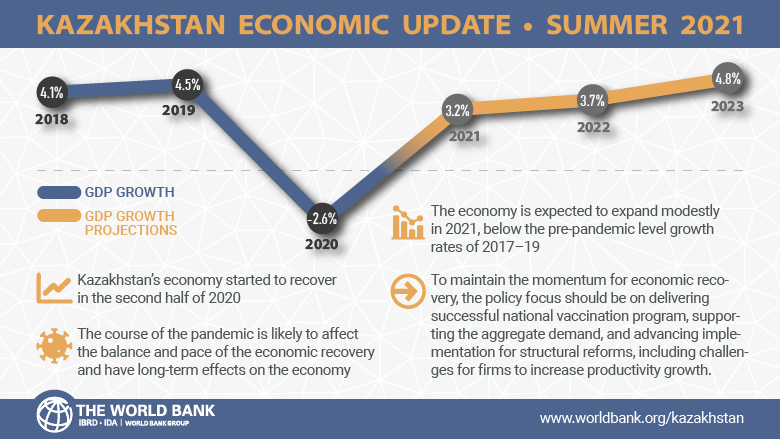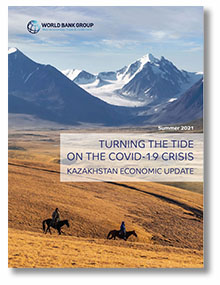After suffering the worst contraction in the past two decades, Kazakhstan’s economy is showing signs that it is entering a recovery phase this year.
The external environment has generally improved and lifted the value of Kazakhstan’s exports by about 5.8 percent in the first quarter (Q1) of 2021 compared with the fourth quarter (Q4) of 2020. In Q1 2021, China experienced a faster-than-expected economic rebound, while the euro area suffered another dip due to COVID-19 resurgence.
A relaxed OPEC Plus production quota and the incremental recovery of global demand lifted Kazakhstan’s oil production by 6 percent in Q1 2021 compared with the lowest output in Q3 last year.
The short-term economic indicators also suggest some improvement in domestic economic activities, including in the services sector. The contraction in retail trade and transport cargo has gradually eased. Construction activities have shown steady growth, supported by a policy allowing pensioners to partially withdraw their savings and by a government program that promotes residential investments.
Business activities are expected to improve gradually. A modest expansion of the economy is projected, by about 3.2 percent in 2021, below the pre-pandemic level growth rates of 2017–19.
Real GDP in the first quarter of 2021 grew moderately at 1.9 percent in seasonally adjusted terms relative to the fourth quarter last year, though it still registered a 1.6 contraction on year-on year basis. Growth is expected to pick up in the rest of the quarters this year, supported by private consumption and moderated inflation, which help ease consumers’ budget constraints.
The course of the COVID-19 pandemic is likely to affect the balance and pace of the economic recovery and cause scarring effects on the economy. The recovery has been uneven, with manufacturing activities recovering faster than the services sector, which had employed a larger share of workers and was hit hardest by the pandemic.
In April 2021, confirmed COVID-19 cases in Kazakhstan jumped again, reaching about 2,900 cases a day, and prompted the authorities to implement occasional restriction measures.
The pandemic resurgence can further create uncertainty for business expansion, which has already been depressed by the shrinking level of corporate credit and risks of higher nonperforming loans.
Restrictions on face-to-face education prompted by COVID-19 are likely to cause learning losses, which can lower expected future earnings, particularly for students from lower socioeconomic backgrounds.
The economic recovery’s resilience and sustainability also depend on structural reforms and adapting policies to meet new development challenges. This year’s budget was adjusted to accommodate an additional 1.7 percent of GDP for spending on health, education, infrastructure, small and medium enterprises support measures, and social assistance. To sustain aggregate demand and momentum for economic recovery, the government should consider avoiding a drastic reduction in next year’s budget deficit.
To support the reopening of businesses and education, more efforts are needed to help people overcome their hesitation toward getting the COVID-19 vaccine. But progress in structural reforms will be essential to sustain growth in the medium term. The new National Development Plan 2020–2025 and the 2021 new Environmental Code are significant initiatives that enable Kazakhstan to promote more inclusive and greener development.
Kazakhstan also made an important pledge as part of the global effort to address climate change: to reach carbon neutrality by 2060.
Operationalizing these initiatives requires stronger policy coordination, better public administration, improved effectiveness and results in public budgeting, reduced market distortion, and a level playing field for the private sector—all of which are longstanding reform issues for Kazakhstan.
The Kazakhstan Economic Update includes findings on factors affecting slow productivity growth among Kazakhstan firms, one of the country's critical development challenges. Productivity matters for sustaining long-term growth and improving standards of living.
Findings from firm-level data analysis suggest a muted contribution of firms’ upgrading capability (innovation, managerial), poor allocative efficiency, and limited contribution from entry/exit dynamics. The authorities could consider coordinating policies to improve productivity growth through ensuring competition in the product market, reducing barriers to entry by state-owned enterprises, improving the effectiveness of investment policy and promotion, and boosting firms’ capability to innovate.

